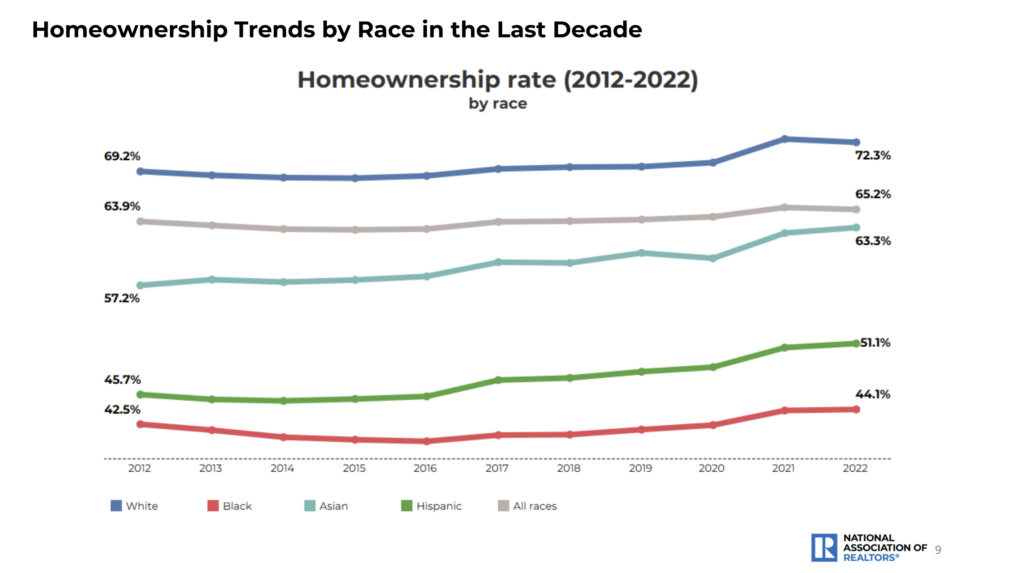On February 1, 1968, two Memphis, Tenn., sanitation workers, Echol Cole and Robert Walker, were crushed to death after sheltering in the compactor of their truck due to the rain. Their deaths sparked the 1968 Memphis sanitation workers’ strike. In March 1968, almost a month into the strike, it was announced that Dr. Martin Luther King Jr. would be visiting Memphis in support of the sanitation workers.
Dr. King returned to Memphis a month later, on April 3, and delivered his famous “I’ve been to the Mountaintop” speech. One day later, he was assassinated.
The assassination of Dr. King served as the catalyst for the passing of the Fair Housing Act on April 11, 1968. The act “prohibited discrimination concerning the sale, rental, and financing of housing based on race, religion, national origin, sex, (and as amended) handicap and family status,” according to the U.S. Department of Housing and Urban Development (HUD).
It was only after Dr. King’s assassination and the riots that followed that then-President Lyndon B. Johnson gathered adequate support to pass the act. “Since the 1966 open housing marches in Chicago, Dr. King’s name had been closely associated with the fair housing legislation,” according to HUD.

The month of April is recognized as Fair Housing Month. Yet, despite the annual recognition of the 1968 Act, Black people all over the country still face housing discrimination.
‘Bad housing blues’
In the very city where the historic sanitation workers’ strike occurred, Black people are experiencing “bad housing blues.” In early 2023, the NAACP Legal Defense and Educational Fund’s Thurgood Marshall Institute and the National Fair Housing Alliance released a 137-page report on “Discrimination in the Housing Choice Voucher Program in Memphis.”
The Housing Choice Voucher (HCV) Program, also known as “Section 8,” is supposed to allow “low-income families, the elderly, and the disabled to afford decent, safe, and sanitary housing in the private market.” The federal government is spending about $32 billion to assist over 2.3 million households.
The two organizations examined the local rental market and performed a fair housing testing audit of housing providers to determine whether housing providers were engaging in source of income or race discrimination against potential HCV tenants, according to the report’s executive summary.

“Fair housing testing is a controlled method of determining whether housing providers are complying with the Fair Housing Act’s prohibition against discrimination because of race or other protected classes,” the report states.
The study, which was conducted over three years, from 2019 to 2021, found evidence of “significant discrimination” based on source of income in Memphis and in Shelby County, where the city is located. In one phase of the study, 84.4 percent of tests documented discrimination based on the tester’s source of income.
Barriers included “no Section 8” policies, HCV tenant quotas, steering or restricting access to housing, employment requirements, minimum income requirements, and payment requirements.
“Source of income discrimination disproportionately affects renters of color, women, and people with disabilities. Because of this, source of income discrimination perpetuates racially segregated communities and neighborhoods with concentrated poverty,” according to analysis by the Legal Defense Fund.
Another phase of the study found that Black testers faced added barriers to finding housing due to race. Out of 16 tests where both a Black and a White tester with similar personal and financial profiles were sent within a short period of each other, six tests, or 37.5 percent, showed evidence of discrimination based on race.

“Racial discrimination manifested as differences in customer service, differences in pricing or availability, differences in access to housing, and differences in terms and conditions,” the report reads.
“Some White testers were coached on how to navigate the rental process in general as well as the specific company’s processes; some White testers were provided with leasing agents’ contact information and were encouraged to follow up with questions or updates; and leasing agents told some White testers that they themselves would follow up if any new properties became available,” it continues.
“During one test, the Black tester was told that units would not be available until two weeks after her desired move-in date, but the White tester was given information about units that were available during her move-in time frame, which was the same time the Black tester had requested.”
In another test, “the White tester was told that to apply she must have a credit score of at least 580, while the Black tester was told that she must have a credit score of at least 600 to qualify for a single-family home.”
In a more recent report published in March, Rachel Bogardus Drew and Fehintola Abioye, both members of the policy development and research team at Enterprise Community Partners, identified discrimination as one of the drawbacks of the HCV program.

“Unfortunately, discrimination against renters based on their HCV status is legal in many states and cities,” the report states. “Even where outright denial is illegal, landlords can employ other methods to avoid renting to HCV holders, such as abruptly ending a call after a voucher is mentioned,
Stating that they were not set up in the voucher program thus could not accept a voucher tenant, or sharing that they accept vouchers based on conditions such as holding a job, having a certain minimum credit score, or having a set income.”
“Depending on local market conditions, landlords can also increase rents above the FMR (fair market rate), making their units inaccessible to voucher holders, or change their screening criteria to ensure certain tenants cannot apply for a unit,” the report continues.
The report’s appendix characterizes HCV recipients and households. Most recipients are over 50 years old and have extremely low incomes. Recipients are 48 percent Black, and most recipient households are headed by women.
Housing: A disinvested resource
Don Washington, executive director of the Chicago Housing Initiative, explained to The Final Call the state of housing in the country and how it got to where it is today.
“Our housing system is suffering from, I would say, a 55-year deficit of public policy,” he said.
He defined the outcomes of such a deficit: the degradation and falling apart of the public asset; the loss of government expertise in the area and the devaluing of the asset to the point where it’s considered a hindrance.

When the public asset, in this case, housing, becomes a hindrance, cuts to it heavily impacts the people who are poorest and who have been the most historically discriminated against, Mr. Washington said.
“That means Black folks, Brown folks, women. That’s what it means. It’s people that society values less. But what it always is, is poor people,” he added.
He noted the importance of acknowledging housing as a disinvested resource, before even talking about discrimination. “Even before you get into our racism, because of our racism, systematically, structurally, we’re disinvesting in this because we don’t care about the people. And when I say we, I mean society at large,” he said.
Student Minister Dr. Abdul Haleem Muhammad, Southwest Regional Minister of the Nation of Islam and Ph.D. in urban planning, traced the root of the problems to debt, inflation and military spending.
“The American taxpayer is now a slave to servicing a skyrocketing debt; a debt that is so large that it sentences future generations to the same servitude to this debt because the politicians are not courageous enough to deal honestly with this problem and present the American people with a real solution,” he quoted from the book, “A Torchlight for America,” by the Honorable Minister Louis Farrakhan of the Nation of Islam.
Sales, rentals and mortgage lending
On April 10, Word In Black, a news collaborative consisting of 10 Black newspaper publishers, published an article on “Fair Housing Laws,” which includes a breakdown of common fair housing red flags in both the sale/rental of housing and mortgage lending.
Red flags in the sale and rental of housing include landlords or sellers refusing to sell or rent to an individual or group based on their protected characteristics (age, disability, race, religion, gender, sex, etcetera); refusing to negotiate for housing; advertising housing to preferred groups only;
Showing apartments or homes in certain neighborhoods only; falsely claiming housing availability; setting different terms or conditions; providing different housing services of facilities; denying access to related services and refusing reasonable accommodations.
Red flags in mortgage lending include refusing to make a mortgage loan; refusing to provide loan information; imposing different terms or conditions; denying property insurance; discriminatory property appraisals and refusing to purchase a loan.
The article notes that all of the above practices are either discriminatory, unlawful, or are violations of fair housing laws.
Cities and states from all over the country are examining fair housing laws, tenants are filing lawsuits and organizations are releasing report after report.
In early April, two Long Island, New York, residents reached a settlement with five housing companies in a federal housing discrimination lawsuit. The companies were accused of racial and source-of-income discrimination. Meanwhile in Boston, a lawsuit was filed in February accusing 20 Boston-area landlords and brokers of housing discrimination against low-income tenants using housing vouchers.
Mr. Washington is aware of at least two current lawsuits in Chicago. His organization is part of one. He explained that it’s hard to prove discrimination, and “the only reason why we do know, is because big organizations like mine have done studies and run programs to discover this discrimination.”
Black homeownership
Discriminatory mortgage lending practices, on top of other barriers, lead to the lack of Black homeownership. Black people make up about 15 percent of the population across the country’s 50 largest metropolitan areas, but they own about 10 percent of owner-occupied homes in the same areas, according to a study by LendingTree.
The company lists potential reasons why, including Black people having less household wealth, having $29,000 less median income than White households and experiencing higher mortgage denial rates. Additionally, banks are still engaging in the Jim Crow practice of redlining,
“an illegal practice in which lenders avoid providing credit services to individuals living in communities of color because of the race, color, or national origin of residents in those communities,” according to the Department of Justice.
The National Association of Realtors releases an annual “Snapshot of Race and Home Buying in America.” The 2024 report states that while Black homeownership increased, with more Black people transitioning to homeownership, the Black and White homeownership rate gap is higher than it was a decade ago, with Black people trailing by 28 percentage points.
The report examines affordability challenges, access to credit and racial discrimination in real estate practices. Black people experience higher housing burdens, as Black homeowners can spend as much as 30 percent or more of their income on housing. Black mortgage applicants were denied at a rate of 26 percent, 10 percent more than White applicants.
One-fifth of mortgages for Black borrowers came with mortgage rates over six percent. Almost 40 percent of Black buyers reported they were steered away from a specific neighborhood, and nearly half of Black buyers reported that they faced discrimination in a real estate transaction with a government agency.
If the federal government issues interest rate cuts this year, Black people looking to own a home may find it slightly easier. Federal rate cuts, or the reduction in interest rates set by the Federal Reserve, would lower mortgage rates and would allow existing homeowners to refinance their mortgages at lower rates, reducing monthly payments.
Yet, the government has been going back and forth on whether or not it will cut interest rates. In recent updates, Federal Reserve Chair Jerome Powell spoke of delaying rate cuts due to high inflation.
“The Federal Reserve is keeping tight reins on the interest rate, thereby diminishing the money supply,” Student Minister Dr. Abdul Haleem Muhammad said. “It’s the interest rates that are keeping a lot of homeowners out of the market. Therefore, there is a conscious, deliberate and structural problem that keeps people out of the market.”
He cited a report by Freddie Mac on the decline in multifamily housing and pointed out the correlation between the lack of multifamily housing and the lack of affordable housing.
Solutions to the housing crisis
Mr. Washington attributed the current state of housing to the 1998 Faircloth Amendment, which prevents the building of new public housing with federal funds.
“It put a freeze on developing purely public housing. From now on, all housing that’s built has to be multi-income housing,” he said.
He advocates for repealing the amendment, restoring public housing as a resource and fully funding public housing. He also proposed the implementation of social services and social housing, a European style of housing that appeals to people of all incomes.
“Social housing, fully funded, affordable public housing. We hit those two things and then we also have particular attention to the social services that people need. If we did those three things, we would radically change the orientation of housing,” he said.
Student Min. Muhammad described the importance of raising the consciousness of Black people, as “to the extent that our people are other than self is the extent that they become undesirable to the landlord.”
For him, the solution is The Muslim Program of the Honorable Elijah Muhammad, the Eternal Leader of the Nation of Islam.
“If the White people are truthful about their professed friendship toward the so-called Negro, they can prove it by dividing up America with their slaves. We do not believe that America will ever be able to furnish enough jobs for her own millions of unemployed, in addition to jobs for the 20,000,000 Black people as well,” he quoted from Point No. 9 of What The Muslims Believe.
He updated the population to reflect current numbers and inserted “jobs” for “houses” to hammer home the same point stating: “We do not believe that America will ever be able to furnish enough homes for her own millions of homeless, in addition to jobs for the 40,000,000 Black people as well.”













